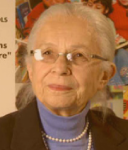Barbara Bowman, M.A.
Early Childhood Development Expert

“For every child, losing mother will be life-changing.
But it doesnt have to be life-shattering.”
My child is so young, and can’t understand much adult conversation. I seem fine right now. How soon should I start to talk about what is happening?
First of all, you need time to process what is going on yourself. Your child has no immediate need to know. First get your own emotions under control. Find some counselors, friends, clergy to speak with and begin with your own feelings. You don’t need to rush into telling a very young child.
How much can my very little child understand about how sick I am,
or that I will die?
Well, at this very young age, a child’s general experience is that people go and then come back. Daddy goes to work, and comes home. Mommy goes to lunch, and comes home. They can’t really understand that someone would go and never come back. That doesn’t happen and they just cannot think like that. They have no experience with anything as permanent as death. Maybe by the time a child is four or five they have seen a dead bird, or stepped on an ant, and that is a first hint of the permanence of death. But they just can’t understand it.
So if my child really can’t understand, how much should I talk about what is happening?
Kids do need words, even if they don’t understand them. The words can have increasing meaning. So you can say, over and over, ‘I will always love you’, ‘I will always be with you’. And that might not mean much right now, but they will have those words and remember them. You can also say things, and they will hear you or other people saying ‘Mommy will die’. Don’t be disappointed that they don’t grasp it. They can still use those words. You can say ‘I may die…’ – and you don’t know when, so you don’t need to say, ‘I will die, and I am going to leave you this scarf of mine’. It is very important for little children kids to have an object. So do talk about what is going on with you. But one thing is sure, talking about it constantly is not the way to go.
Kids do need words, even if they don’t understand them.
The words can have increasing meaning.
So you can say, over and over,
‘I will always love you’, ‘I will always be with you.’
How can I prepare my child for my death?
There’s really no way to prepare a child for that. There’s not a lot you can do. What you can do is be the best possible Mom you can be, now. And begin to make sure caring adults are in place around your child. But there is no way, really, to prepare anyone for death. The truth is that at the time of your death, even the adults will be distraught. It is going to be difficult.
I feel so guilty. Will my child’s whole life be more difficult because I died?
Some kids are very traumatized, and some kids deal with losing their mother very gradually little bit by bit, and you would never be able to tell what had happened. There are as many ways of dealing with it as you can imagine. But your death does not have to be a death sentence for your child. It is hard to think about your child going on without you, but he or she will. Your death will be life changing, but it does not have to be life-shattering for your child.
Dr. Barbara T. Bowman began her career as a teacher for children in therapeutic day care. She went on to found and later served as president of the Erickson Institute, focused on social and emotional development of young children. She recently retired as the Chief Early Childhood officer for the Chicago Public Schools.